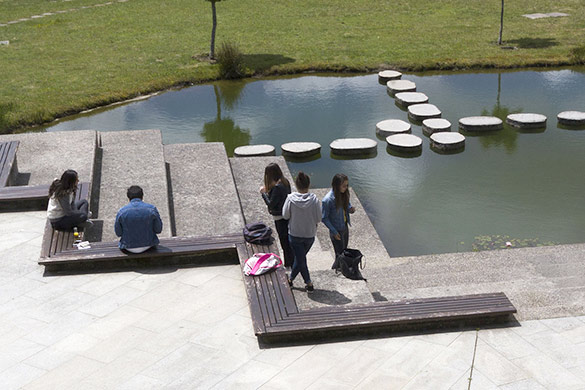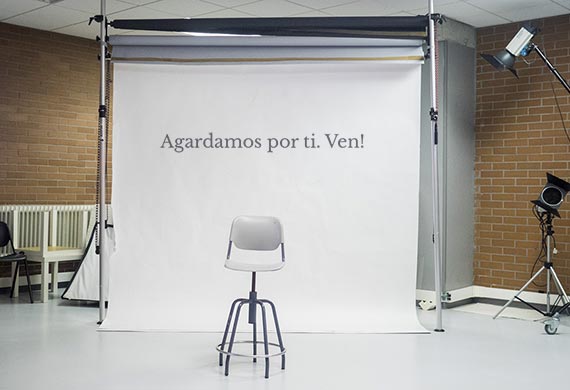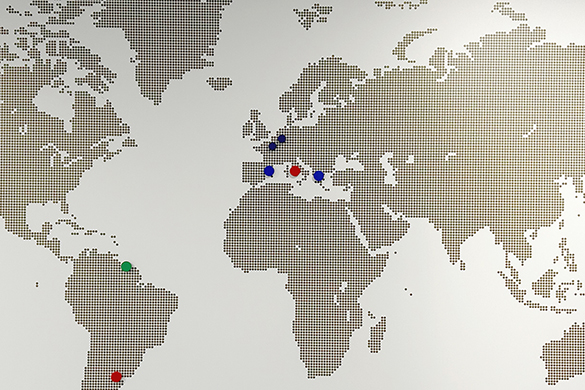Applying and Admission
Want to know how to apply for admission to Universidade de Vigo?
You will be eligible to apply to any Uvigo undergraduate programme if you have successfully completed the university entrance exam (EBAU) or be in possession of an academic certificate which meets the admission requirements.
You may find all the necessary information on applying and admission to our degrees in the link below:
A degree is a general training for students in one or more disciplines, aimed at preparing them to carry out professional activities.
The Universidade de Vigo degree programmes have 240 ECTS credits that are divided into 4 courses of 60 ECTS credits each, except for the PCEO (joint official study programmes). They conclude with the preparation and defence of a Final Degree Project (TFG).
Access routes
I have a baccalaureate degree
Access from baccalaureate
Those who meet one of the following requirements will be able to access official university degree courses:
- he students of baccalaureate of the Spanish Educational System or equivalent, who passed the baccalaureate evaluation test for university access (hereinafter ABAU).
For the allocation of places, the admission grade will be calculated taking into account the following formula:
Admission mark = 0,6 * NMB + 0,4 * CPO + a * M1 + b * M2
- NMB: average baccalaureate mark
- CPO: qualification of the compulsory part of the baccalaureate assessment test for university access.
- M1, M2: qualifications of a maximum of two of the four subjects of which the student was examined in the voluntary part or of the corresponding core subject of modality, which provide the best admission mark.
- a, b: parámetros de ponderación das materias da parte voluntaria ou da materia troncal de modalidade da proba de avaliación de bacharelato para o acceso á universidade que proporcionen mellor nota de admisión.
I have a higher technical qualification in vocational training
Access to university from vocational training
Academic and vocational guidance
Students who hold the degrees of Higher Vocational Training Technician, Higher Sports Technician or Higher Technician in Plastic Arts and Design, or equivalent degrees, will be able to access official university degree courses, without the need for a test.
For the awarding of places, the admission mark will be calculated taking into account the following formula:
Admission mark = NMC + a * M1 + b * M2
- NMC: average mark of the Higher Level Vocational Training Cycle.
- M1, M2: qualifications of a maximum of two of the four subjects examined by the student in the voluntary part and/or the core subject of the corresponding modality, which provide the best admission mark.
- a, b: parámetros de ponderación das materias da parte voluntaria ou da materia troncal de modalidade da proba de avaliación de bacharelato para o acceso á universidade que proporcionen mellor nota de admisión.
Tests for over 25s and over 45s
- Over 25s
People over 25 years of age in the calendar year in which the test is held who do not hold any academic qualification (baccalaureate or equivalent, higher technical or technical vocational training, etc.) that allows access to university by other routes.
- Over 45s
People over 45 years of age who do not have any academic qualification that enables them to access university by other routes, will be able to access official university degree courses by passing an adapted access test, if they reach or have reached 45 years of age in the calendar year in which the test is held.
I have a university degree
People with a university degree (degree, diploma, degree and engineering) or equivalent, can apply for a place to do any university degree.
Pre-registration
To access the UVigo it is necessary to make this pre-registration. Graduates can apply in two ways, in a single application and in the call for applications in autumn:
General fee:
- Aptitude tests for university access (university entrance exams, PAU, ABAU...)
- Higher Level Training Cycles, Vocational Training II, Profesional Modules Level III
Because of their university degree
I have studied in another country
Students with pre-university studies
- Students in possession of the European baccalaureate degree, those who obtain the international baccalaureate diploma and students with degrees, diplomas or baccalaureate studies from educational systems of member states of the European Union or other countries with which international agreements will be signed, can access directly with the UNED credential that certifies that they have the requirements established in their educational system of origin, to access the university.
- Students in possession of qualifications, diplomas or studies equivalent to the baccalaureate degree of the Spanish education system from education systems of member states of the European Union or those of other states with which international agreements have been signed, when these students do not meet the academic requirements required in their education systems to access their universities; e estudantes en posesión de títulos, diplomas o estudos obtidos o realizados en sistemas educativos de estados no membros da Unión Europea o que no tendo acordo internacional, deben homologar o declarar a equivalencia dos seus estudos ao título de bacharelato do sistema educativo español. The homologation credential is a sufficient qualification for access, with a conditional character and a value of 5 points.
- Students in possession of qualifications, diplomas or foreign studies recognised or declared equivalent to the official qualifications of higher vocational training technician, higher technician in plastic arts and design or higher sports technician in the Spanish education system, will be able to access directly with the UNED credential.
- Students in possession of qualifications, diplomas or studies other than those equivalent to the qualifications of baccalaureate, higher vocational training technician, higher technician in plastic arts and design or higher sports technician in the Spanish education system, obtained or carried out in a member state of the European Union or in other states with which international agreements have been signed, when these students meet the academic requirements required in the respective state to access their universities. They will be able to access with the UNED credential.
In all cases they will be able to increase their initial access grade by taking the voluntary part of the ABAU, organised by the UNED and the Galician University System (SUG) through theCIUG
Students with university studies
In order to facilitate the incorporation of students with university studies from other countries, UVigo establishes a specific procedure for the partial validation of these university studies.
They will be able to apply for partial validation of foreign university studies who are in one of the following situations:
- Students with university studies that have not been completed with the corresponding degree.
- Students with foreign university studies completed when:
- If having requested the homologation this was denied, provided that the denial is not based on any of the causes listed in article 3.2 of R.D. 967/2014.
- If the person does not request the homologation and declares in writing that he/she will not request it.
I have started university studies at another Spanish university.
You can apply for access through this route if you have started but not finished your studies. It will be necessary to obtain at least 30 ECTS credits or apply for pre-registration through the CIUG.
Admitted students are obliged to request the transfer of their academic transcript to their university of origin.
I transferred my transcript and I want to resume my studies at UVigo.
I must have passed a minimum of 12 credits in the degree I want to retake.
The centre will be able to attend the applications presented according to its organisational possibilities, since there is no offer of places approved for this procedure.
Students from previous education systems
Students who were eligible for university entrance according to the Spanish education system regulations prior to Organic Law 8/32013, of 9 December, will be able to access official degree courses.
If they wish to improve their marks, they can sit the
ABAU.
Formalities common to all access roads
Cut-off marks
The cut-off mark is the university entrance mark of the last student to gain admission to a degree with a limited number of places. These marks are always indicative, since they are those of the previous year and, therefore, only serve as a reference to the student because for the access to the current academic year they could go up or even down.
If you see that your grade is not enough to get into the grade you want, you can raise your grade.
Pre-registration
What is it?
How does it work?
Pre-registration at NERTA
Poderá facerse a través dos procedementos telemáticos que se establezan (NERTA) ou entregándoa debidamente cuberta nos LERD de 9.00 a 14.00 horas.
O estudantado que non teña os datos na aplicación deberá rexistrarse.
Poderá presentar un único impreso de solicitude nun mesmo curso académico, no que se indicará por orde de preferencia ata un máximo de 5 titulación diferentes nas que desexa matricularse, podendo chegar ata un máximo de 10, se as solicitudes corresponden a titulacións iguais impartidas en diferentes centros.
Na convocatoria de setembro non se ofertarán as titulacións que teñan todas as prazas esgotadas na matrícula de xuño ou naquelas nas que a CIUG estimase que existen datos obxectivos que aconsellan esta acción.
As universidades desestimarán as solicitudes de acceso que non cumpran cos requisitos esixidos. Contra esta decisión poderán presentar reclamación ante o presidente da CIUG, nos prazos establecidos.
- Calendario
- Impreso de solicitude. Poderás descargarlo da páxina da CIUG
- Oferta prazas e códigos das titulacións
Orde de preferencia
Á hora de realizar a preinscrición, a orde de preferencia é fundamental, posto que o estudantado será admitido nunha única titulación, que será aquela de maior preferencia na que acade a nota do último estudante admitido. O resto das titulacións solicitadas de menor preferencia quedarán eliminadas automaticamente da listaxe de agarda.
Poderán realizarse as modificacións que sexan necesarias durante o prazo de preinscrición.
Documentación
O estudantado do Sistema Universitario Galego (SUG) non será necesario que presente a copia do DNI nin a tarxeta de cualificación. Toda a documentación que se debe presentar poderá consultarse na convocatoria que publicará a CIUG na súa páxina web www.ciug.gal.
O prazo de presentación é o que figurará na convocatoria e poderá realizarse ben presencialmente nos LERD ou ben por correo postal (neste último caso, as fotocopias dos documentos aportados deberán estar debidamente compulsados por organismo oficial, a compulsa deberá ser orixinal).
As universidades adxudicarán as prazas atendendo aos seguintes criterios:
- En primeiro lugar, adxudicaranse prazas aos estudantes que reúnan os requisitos académicos para o acceso á universidade na convocatoria ordinaria do ano en curso ou en convocatorias ordinarias ou extraordinarias de anos anteriores.
- En segundo lugar, adxudicaranse prazas aos estudantes que reúnan os requisitos académicos para o acceso á universidade na convocatoria extraordinaria do ano en curso.
En todo caso, deberase ter en conta que o estudantado que presente na convocatoria extraordinaria a súa solicitude de admisión para o ingreso, terá prioridade na adxudicación de prazas de setembro, aínda que superase a proba de acceso á universidade ou os estudos que o habiliten para acceder á universidade na convocatoria ordinaria do ano en curso ou en anos anteriores. - En terceiro lugar, adxudicaranse prazas aos estudantes que non superasen a proba de acceso á universidade organizada pola UNED ou a proba de avaliación de bacharelato para o acceso á universidade ( ABAU) organizada por calquera das universidades públicas españolas.
A CiUG asignará as prazas ofertadas en cada ensino universitario en cada un dos prazos de matrícula que se establezan. A cada estudante asignaráselle o ensino universitario de maior preferencia que lle corresponda en función da cota pola cal se solicita o acceso e tendo en conta, en todo caso, a orde de prelación, os criterios de valoración e a preferencia para a adxudicación de prazas establecidos.
En cada prazo de matrícula publicarase a relación de estudantado admitido para matricularse en cada ensino universitario, indicando os lugares e as datas para formalizar a matrícula. O estudantado admitido para matricularse no ensino universitario solicitado en primeiro lugar de preferencia, deberá matricularse no prazo establecido para o efecto; de non facelo perderá os seus dereitos de matrícula nesa convocatoria. Enténdese por primeira preferencia aquela que o estudantado solicite en primeiro lugar ou en lugares sucesivos se os ensinos universitarios solicitados por enriba del esgotaron as súas prazas.
Na convocatoria extraordinaria non se ofertarán prazas nos ensinos universitarios que teñan a matrícula cuberta na convocatoria ordinaria, ou aqueles nos cales a CiUG considere que existen datos obxectivos que permitan prever esa circunstancia. En todo caso, non se poderán deixar prazas vacantes previamente ofertadas mentres existan solicitudes formalizadas dentro dos prazos establecidos.
As universidades poderán establecer condicións ou probas especiais para o acceso a determinados ensinos. Estas condicións ou probas especiais deberán ser incluídas polas universidades na memoria do plan de estudos verificado e autorizado.
O estudantado poderá presentar reclamación á súa asignación de prazas no LERD en que presentou solicitude de acceso e dirixida ao presidente da CiUG. A resolución da reclamación correspóndelle á CiUG e será asinada polo delegado do reitor da universidade en que se imparta o ensino universitario obxecto da reclamación. O resultado comunicaráselle á persoa interesada a través das listaxes de asignación de prazas ou dunha notificación persoal e indicarase, se é o caso, o prazo para matricularse.
Contra a resolución poderá interpoñerse recurso potestativo de reposición no prazo dun mes perante a propia CiUG, que porá fin á vía administrativa. Neste caso non se poderá interpoñer o recurso contencioso-administrativo mentres non recaia resolución expresa ou presunta do recurso potestativo de reposición.
No caso de presentar recurso contencioso-administrativo, a Administración demandada será a universidade responsable do ensino universitario en que o estudante solicita o ingreso. No caso de demanda, a responsabilidade en materia de persoal corresponderá a cada universidade.
The total number of places offered for each degree will be divided between the general quota and the reservation fee:
General fee
- They will be awarded to students according to their admission grade.
Reservation fees
- Graduates: 1% of the total number of places will be reserved, only for the call for applications in autumn.
- Students with a degree of disability equal to or higher than 33%: 5% of the total number of places will be reserved.
- Students qualified as high-level sportspersons: 3% of the total number of places will be reserved, except for the degrees in Physical Activity and Sport Sciences and Physiotherapy, where 8% will be reserved.
- Over 25 years old: 2% of the total number of places will be reserved, only for the call for applications in autumn.
- Over 45 years of age: 2% of the total number of places will be reserved, only for the call for applications in the year in terms of personnel will correspond to each university.
More information at
Students Information Section
Edificio Redeiras
Praza do Berbés, núm. 11
36202 Vigo
+34 986 813 630 | 986 813 755
sie@uvigo.gal







